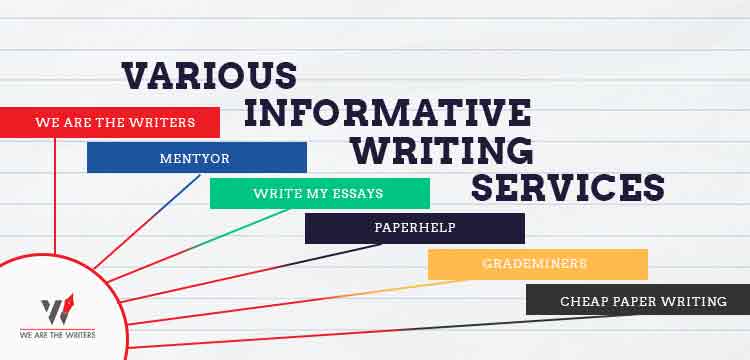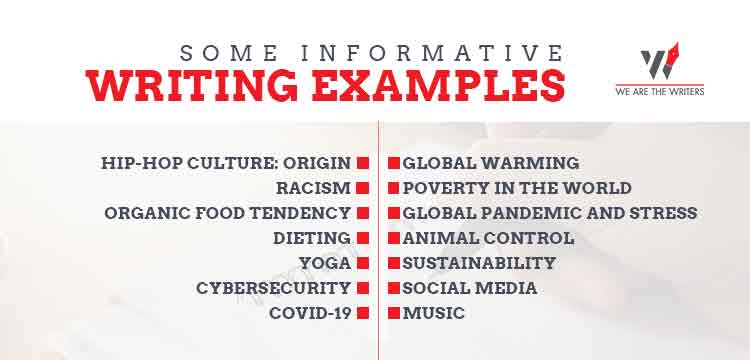When we hear the term ‘Informative Writing’, what comes to our minds first? It is possible that we think about the literal meaning first. Simply put, information that is being conveyed to the readers through writing essays is called informative writing.
It is something that is written with the purpose of educating someone. However, there are many layers or types of informative writing. Some informative writing examples may include Encyclopedia, essays, instruction manuals, academic journals, research papers etc.
In this blog, we will discuss some points that build a well-defined informative writing structure. There are some exciting activities that will bring out your creative side! This will also help you understand what is informative writing. This blog contains some interesting and relevant informative writing topics as well. To discover more, read on.
Suggested read
Table of Contents
WHAT IS INFORMATIVE WRITING ?
Informative writing is quite similar to persuasive writing, which is largely based on facts and statistics. But informative writing structure differs from persuasive writing in some fundamental points. Whereas persuasive writing tends to distort facts, informative writing examples are proof that it strictly adheres to the facts available. Persuasive writing often presents the article or essays to the readers in an opinionated way. But informative writing structure is such that it presents opinion in an unbiased way. Purely informative writing gives the reader an overview of all dimensions of an issue. From these types of informative writing, a person can draw his/her own inferences without being influenced by the writer.

DIFFERENT TYPES OF INFORMATIVE WRITING STRUCTURE
Among the various types of informative writing, we will discuss the 3 most important ones here. These 5 different types of informative writing help writers to explain something in a simple, understandable format. They are as follows.
CAUSE AND EFFECT
A cause and effect informative writing structure explains how one event, which is the cause, leads to another event i.e. the effect. That is to say, the article may be further concentrated on the outcomes of a single cause or more. Either way, it offers a useful way to discuss the relationship possible between the two events. It details the relationship connecting the effects between two topics. The article illustrates how one person, thing, thought or event actually impact another individual, item, idea or occasion. This may be through the use of conventional academic language and informative writing activities.
Examples of cause and effect types of informative writing – So that, as a result of, therefore, in consequence, this led to, if…then, etc.
COMPARISON AND CONTRAST
A comparison and contrast study analyses two informative writing topics by comparing, contrasting or comparing them. The aim is not to state the obvious factor, but to illuminate the less prominent differences or similarities between two subjects. Comparison and contrast are factual in nature. It is where two or more things, ideas, concepts, items, sites, etc, are described as differences and similarities.
Examples of comparison and contrast types of informative writing – Unlike, different from, in comparison, similarly, in contrast, although, unless, same as, etc.
TIME AND SEQUENCE
These are types of informative writing that depend on the sequential placing of information. All the information present to the readers is arranged in a chronological informative writing structure. Texts that use this format do not typically present an event or instruction.
Examples of time and sequence informative writing – first, from, how to, in order, lastly, meanwhile, after that, next, now, until, while, after, before, during, earlier, eventually, finally, etc.
PROBLEM AND SOLUTION
Problem and solution types of informative writing are pieces in which writers reveal some problems at first. After that, they offer some potential ways and means to solve them. In this type of writing, the problem is generally viewed as part of the introduction. The solution is often revealed towards the end.
In order to argue in favour of the solution to the problem, the author may also explain why. In order to advance the discussion or avoid controversies, the author only uses the factual information required. When students scrutinise a document that uses the text framework problem/solution, at least two things should be examined. They are – the argument as a whole and its individual components.
Examples of problem and solution types of informative writing – a possible answer, as a solution, in response to that, the problem is solved by, a potential alternative is, therefore, conclusion, etc.
You may also like to read :
- Content writing mythbusters | 8 content writing myth quashed.
- Pre Writing – The First Step of Writing Process – 5 min
INFORMATIVE WRITING DEFINITION

What do we do in order to describe a complex topic or subject? We define it first, followed by a lengthy discussion in simple terms about how and why it is important. Description and definition types of informative writing simply describe text which uses this structure. You can also find out why the topic described is important. This type of writing often provided the reader with the described subject examples.
These texts also contain many details about what they describe, with few exceptions. A text that uses this structure could also explain why it describes something. The whole purpose of description or definition types of informative writing is to deliver information.
Examples of description or definition types of informative writing – In novels, literary nonfiction works, newspapers, and science-level texts – we come across descriptive texts everywhere.
STEPS TO CREATE AN INFORMATIVE WRITING STRUCTURE

While informative writing may seem something anyone can write, it isn’t that easy. There are two things that are necessary to write a proper informative writing structure. They are:
- Professional writing skills
- Proper understanding of the subject or topic of discussion
In the following points, we have explained the steps that you will need to follow in order to create the perfect informative writing structure.
STEP 1
The first thing we should keep in mind while writing an informative piece of article is to stick to the facts.
STEP 2
Keep your paragraph count to 3. Divide those paragraphs according to topic or sub-topic.
STEP 3
Write the body of the paragraphs with supporting evidence of information with in-text citations.
STEP 4
Provide a lot of examples to illustrate your point in your informative essays.
STEP 5
Never try to persuade the readers to believe in your opinion, present them with correct facts and let them draw their own conclusions.
STEP 6
These are some golden rules to write an informative piece of article. Professional writers always stick to these basic rules when it comes to informative writing.
VARIOUS INFORMATIVE WRITING SERVICES

The dissemination of knowledge without influencing the readers in a biased way is something informative writing services focus on. Informative writing is one of the most reliable writing forms. In the list below, we have ranked some of the best informative writing services available.
- We Are The Writers
- Mentyor
- Write My Essays
- PaperHelp
- GradeMiners
- Cheap Paper Writing
INFORMATIVE WRITING TECHNIQUES
No matter which field of occupation you are in, writing skills will help you go a long way. and what is informative writing without its techniques. Whether you are a student or a teacher or a businessman, you don’t need to be a professional to write moderately well. These techniques are based on the purpose of writing and the right strategy.
The purpose of these techniques is to present the facts to the audience in a simple, easy-to-read format. We have elucidated some of the informative writing techniques in the points below.
CHOOSE AN INFORMATIVE WRITING TOPIC
The first step to writing useful informative articles is to choose a good, informative topic. Brainstorm the informative writing topics or search for the ones that interest both you and your readers. Do not select topics that are too narrow or too large. Wherever possible, avoid biased information. To explain the subject in detail, you should provide conclusive sources. Remember to include the answers to these 5 questions in your writing – what, where, when, how and why.
STRUCTURE OF THE INFORMATIVE WRITING TOPICS
The key to maintaining exceptional informative writing techniques is to follow a proper structure. We have already discussed it in the earlier part of this blog. Follow the 3 paragraphs rule and stick to the facts. Be it cause-effect, problem and solution or description-based writing, the best informative writing services always follow a perfect structure.
PLANNING OF THE INFORMATIVE WRITING TOPICS
There is a quote by Benjamin Franklin which goes like, “If you fail to plan, you are planning to fail. There is nothing more accurate than this. Planning your informative essays or articles in advance gives you an upper hand. You can chalk out the points you will include in your essay and also proofread your facts. Providing information in an organised way is something informative writing services always opt for.
SOME INFORMATIVE WRITING EXAMPLES

Every day we read thousands of informative writing examples which we might not even recognise while reading. They are something we have been reading since our childhood and continue to read even today. Here are some informative writing topics or informative writing examples that you might have come across.
- Hip-hop Culture: Origin
- Racism
- Organic food tendency
- Dieting
- Yoga
- Cybersecurity
- COVID-19
- Global Warming
- Poverty in the world
- Global pandemic and stress
- Animal Control
- Sustainability
- Social Media
- Music
These informative writing examples are based on broad topics which have thousands of articles written on them. The best way to judge whether it is a good one is to refer to the source of the article. The only way to do that is to opt for good informative writing services.
You may also like to read : Learn Effective Writing Process In 5 Simple Steps
INTERESTING INFORMATIVE WRITING ACTIVITIES
There are many exciting informative writing activities that we may engage in. Build a writing strategy using proper planning and resources. Read the list below to discover some interesting informative writing topics or informative writing activities.
- General Information About Music Composition
- Facts On The Wonders Of Nature In The World
- All About The Cooking Of A Seafood
- Summer Time Words Can Best Describe
- Example Of Mobile Apps In The Learning Process
- Plastic Operation: Pros And Cons
- Photography: History And Evolution
- Various Ways To Stay Healthy Using Popular Foods
These informative writing activities will bring out your creative side. Remember to present only factual information without being biased. The main goal of such informative writing activities is to educate your readers.
FINAL THOUGHTS
The most critical aspect of informative writing examples is to explain them in a reasonable and intelligent plan. However, there are more ways than one, as we have seen in the different types of informative writing. The informative writing services mentioned in this blog always stick to precise informative writing techniques. That is why they are considered experts in the field. They provide us with good pieces of content in a structured way and that is all that matters.
In conclusion, I’ll leave you with a quote by one of the greatest scholars in history:
“To write well, express yourself like the common people, but think like a wise man.”
― Aristotle.





 WhatsApp
WhatsApp